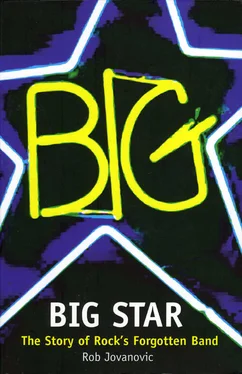Banker Jim Stewart and his sister Estelle Axton founded Stax (and gave it its name from the first two letters of their surnames, St-Ax) after Stewart had begun recording country acts in 1957. His studio had had its first hit with the Mar Keys’ instrumental jam ‘Last Night’ in 1961. The Mar Keys were the first white band in Memphis with horn players, a black band trademark. Booker-T and the MGs’ ‘Green Onions’ in 1962 was another nationwide success for the studio. The next decade saw Stax have over 150 Top 100 singles. The ‘Stax sound’ came from bands that were used to playing to both black and white audiences, and then synthesizing this mix to a precise degree. Otis Redding, Carla Thomas and Sam & Dave became international stars on the back of it. Stax would later become embroiled in the Big Star story.
The future members of Big Star arrived just before rock’n’roll took off. Chris Bell was born in Memphis on 12 January 1951, the second youngest of six children: Virginia, David, Vicky, Sara, Chris and Cindy. Bell’s mother, Joan Branford, was English. She met US B-17 bomber crew member and Memphis native Captain Vernon Bell in Norwich during the Second World War. The pair married in England, moving back to the United States at the end of the war.
Once back home, Vernon was discharged from his military duties and set up what was the first of a string of cafés and restaurants. The Little Tea Shop opened its doors for business in January 1946, the Knickerbocker restaurant on Poplar Avenue followed, as later did a series of Bonanza Steak Houses and Danvers Fast Food outlets. 7
The Bell family expanded as fast as their restaurant business and with the family home fast becoming too small for six children the Bells moved out to East Memphis in 1956. Chris and younger sister Sara were closest in age and were often mistaken for twins, not just because of their similar looks and age, but because they went everywhere and did everything together. All of the Bell children attended White Station Elementary School at the corner of Poplar and Perkins and went on to White Station High School, although Chris changed schools later on. The Bells were a typical well-off middle-class family who attended the local Episcopal church on Sundays.
Chris wasn’t a big music fan – an early favourite was Brenda Lee – but he was an avid comic book collector. ‘I remember Chris being curious about many things as a young child,’ says David Bell. ‘He had a sort of scientific bent along with an aptitude for mathematics. I never had the patience that he displayed in putting things together, whatever they might be.’ This precocious will to learn would later be borne out in his approach to studio work.
On 26 January 1951, exactly two weeks after Chris, Andrew Hummel was born in Valley Forge, Pennsylvania, where his father, John Hummel, was serving in the Navy. After Andy’s younger brother, Robert, was born in 1952 the family moved back to Elkwood Drive in Memphis and when a third child, Sally, came along they moved to Worthington Circle in midtown Memphis. John Hummel was a doctor who had been put through medical school by the Navy so he was required to serve a certain amount of time afterwards. When his service ended he moved to Memphis to set up his own practice as a gynaecologist.
Their first move to Elkwood Drive was actually covered in some detail in the local press. Andy’s mother, Barbara Jo Walker Hummel, a native of Murray, Kentucky, had been crowned both Miss Memphis and Miss America in 1947 and the local press followed her every move. For example, a full page in the Memphis Press-Scimitar was given over to her brief visit to Memphis in 1947 to look at engagement rings during a stop-off at the airport between promotional duties. ‘Thousands Brave Electrical Storm To Greet Miss America at Airport’ the headline proudly states, covering the meeting of Barbara Jo, her father and John Hummel to look at prospective rings for thirty minutes before flying on. In Memphis she presented a daily TV programme for WHBQ from 1955, called Lady of the House, in which she hosted guests and gave tips to housewives from three till four in the afternoon. Meal planning and food preparation was the main thrust of the show, which was aired just in time for wives to prepare the evening meal for husbands coming home from a hard day at the office. Andy often made a guest appearance on the show before he started at school. Barbara could often be found in the local papers during the 1950s even if it was just a photograph of her dressing her children or teaching them how to read. As well as bringing up three children she found the time to perform in musical comedy stage shows (she was an excellent singer by all accounts), model clothes and later (unsuccessfully) run for political office in the state legislature.
At the same time that Chris Bell was starting at White Station, Andy began at the all-male Presbyterian Day School. ‘Elementary school was kind of a big mystery to me,’ recalls Hummel. ‘I never quite got it and never really fitted in very well. I was very bored and became rather lazy around the third grade. My parents never seemed to take much of an interest in my schooling other than just sending me off, and then screaming at me when my grades were bad. One thing they did do was make me take piano. Starting in the third grade I had a lesson every week and had to participate in recitals, which I hated of course.’
Jody Stephens was born in Memphis on 4 October 1952, the middle of three brothers – Jimmy was two years older and David five years younger. Stephens’s father, James, from Virginia, and mother, Rose, from Massachusetts, met in Washington at a roller skating rink. When they started talking, it turned out that they both were working at the same hospital, the former in the X-Ray department and the latter as a secretary. Jody was enrolled at the Colonial Elementary School before moving on to Willow Oaks Elementary, a middle-class but less exclusive school than either Bell or Hummel’s.
Jody’s father would occasionally sing and play guitar for his boys, usually in a country style, though most music around the house in Jody’s formative years was described by his brother Jimmy as ‘easy listening’. The brothers usually got their ‘pop fix’ by listening to the Top Forty radio shows. Apart from short stints of piano lessons, none of the Stephens boys played an instrument in their early days. ‘Jimmy and I were on the Willow Oaks [Swim] Club which was very middle class,’ says Jody. ‘He was a great diver so he was on the dive team as well. Now that I think of it, I may have been on the dive team but [was] not nearly the diver Jimmy was. I don’t think I ever won a race but did finish second and third occasionally. They used to give us spoonfuls of honey to rev up the energy level and I think they even put ice in the water for faster swim times.’
‘My parents tried to get me to take classroom-style piano lessons,’ explains Jimmy. ‘My first teacher had a nervous break-down; the second was killed in a car wreck; and the third attempt coincided with basketball. And basketball won. My dad had tried to teach me some things by ear on piano but a friend of mine was taking guitar lessons and I wanted to take [them]. But my parents were concerned that my interest in the guitar would go the same way as the piano, so I never took any guitar lessons.’
This was a temporary setback, though, because soon almost every boy in the country wanted to be in a rock band and play guitar. The number of guitar players in America increased dramatically in the aftermath of the Beatles’ prime-time television appearances. In Memphis literally hundreds of bands sprang up from nowhere, playing both the local R&B dance hits and the brand new sounds of the British Invasion. Hummel, Bell and Stephens would be among these teenage rock-star wannabes and, despite living in different parts of town, their love of music would soon cause their paths to cross.
Читать дальше











